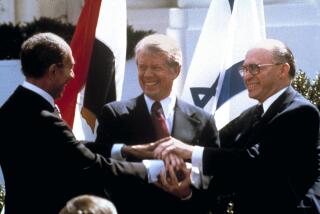Loose-cannon Kadafi
- Share via
LIBYAN DICTATOR Moammar Kadafi might have given up his quest for weapons of mass destruction, but the fallout from his mouth can still threaten millions.
Kadafi on Sunday dropped a bomb on the extraordinarily sensitive negotiations to resolve the humanitarian crisis in Sudan’s Darfur region, urging his fellow tyrants in Khartoum to reject a deal to send United Nations troops to the troubled area. “Western countries and America are not busying themselves out of sympathy for the Sudanese people or for Africa but for oil and the return of colonialism to the African continent,” he bellowed.
Not only is this absurd -- the U.N. already has 10,000 peacekeepers in southern Sudan sent in 2005 to stabilize a separate conflict there, and to date they haven’t seized any Sudanese oilfields or founded any colonies -- it’s reckless. The Sudanese government’s fears of ulterior motives by the international community have for years prompted it to block efforts to send U.N. troops to Darfur, where government-armed militias have slaughtered hundreds of thousands and displaced millions more. Though the cabal in Khartoum is probably more worried about international prosecution for war crimes than about colonialism, such views have provided it with political cover and support throughout the Arab world. And Kadafi enjoys considerable clout in Africa because of his oil wealth and status as a conflict mediator.
A deal to finally end the atrocities in Darfur is teetering on a knife’s edge. Last week, Khartoum and international negotiators seemed to have accepted a compromise agreement under which a hybrid U.N. and African Union force of about 20,000 would replace the 7,000 African Union troops now in Darfur. Yet since then, the Sudanese government has sent mixed signals about whether it would really acquiesce.
There is reason to fear that Sudan is only stalling for time. In recent weeks it has restricted aid organizations and journalists from traveling in Darfur while launching a new military offensive that has killed hundreds of civilians there. Meanwhile, the mandate for the existing African Union force expires Dec. 31; if no deal to augment and replace it has been reached by then, the killings will doubtless intensify.
Before an international force can be mobilized, there are still delicate political decisions to be made, such as whether it would be empowered to protect villagers or simply monitor the carnage. To resolve them will require an unusual degree of unity among players as diverse as the Arab League and the U.N. Security Council. That’s tough enough to achieve without a loose cannon like Kadafi flapping his gums.
More to Read
Sign up for Essential California
The most important California stories and recommendations in your inbox every morning.
You may occasionally receive promotional content from the Los Angeles Times.













